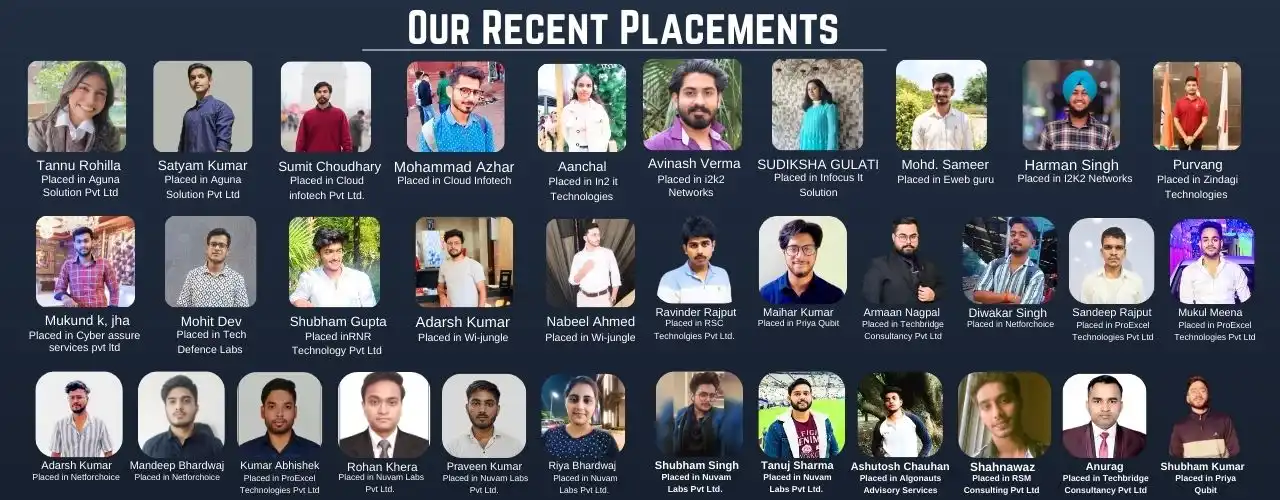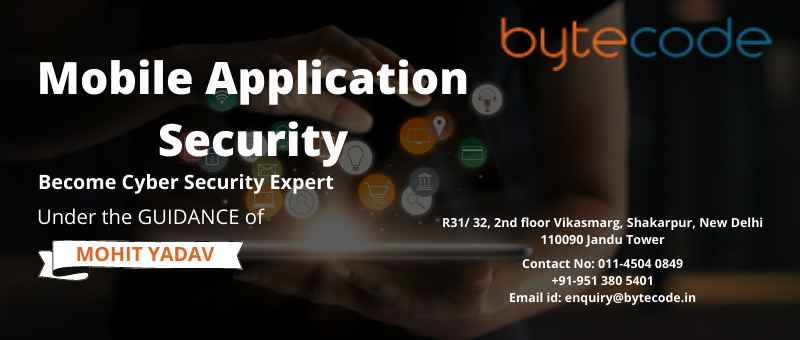Mobile Application Security Training and Certification Course
CLASSROOM AND ONLINE TRAINING ARE AVAILABLE.
It is important to note the state-of-the-art facilities offered at the Saket and Laxmi Nagar sites in regard to the well-known Mobile Application Pentesting Course in the Delhi NCR area. The mobile application pentesting course in Delhi and the premium mobile app security training will offer a thorough understanding of mobile architecture fundamentals.
Highly qualified and seasoned instructors with more than eight years of expertise in the field will be leading this program. With the help of real project-based training methods, the immersive Mobile App Security Course offers learners the chance to obtain invaluable real-world experience.

Mobile Application Penetration Testing Course Overview
Mobile applications have grown to be an essential part of our everyday lives, improving our quality of life with their wide range of features that support both personal and professional responsibilities. Furthermore, a thorough Online Mobile Application Pentesting training program and an offline version in the Delhi NCR region are necessary to build strong mobile application security protocols and assess the efficiency of these applications.
If people really want to get a mobile security certification under the guidance of an experienced and highly qualified teacher, they should think about signing up for the Mobile Application Pentesting course that is being offered at the Bytecode Cyber Security Institute’s educational branches in Saket and Laxmi Nagar.
Mobile Application Security Course in Delhi Course Description
Skilled individuals who have the right knowledge of the corresponding fundamental techniques, tactics, and tools of mobile application penetration testing are needed to perform this activity successfully. Additionally, we must give the security of these mobile applications top priority because of how much our everyday lives depend on them.
Bytecode Security offers mobile application security training in Delhi that covers the fundamentals of safe mobile application protocols. The program is extensive and is offered at Saket and Laxmi Nagar. Learners with a deep intention to do something in this particular trajectory can opt for this mesmerizing mobile application security training program under the career-promising guidance of world-class instructors with more than 10 years of quality work experience.
Mobile Application Penetration Testing Certification Training
We understand that prospective students who work in fields unrelated to mobile application security may be concerned, but we also appreciate their enthusiasm for this fascinating topic. However, because of their regular work obligations, these people are severely time-constrained. For students in particular student groups, Bytecode Security provides both offline as well as online certification courses for mobile security training. In as little as 60 hours, these courses have the capacity to turn a beginner mobile application security analyst into a competent professional.
Furthermore, people can sign up for extensive online as well as offline courses on mobile application pentesting. Virtual Instructor-Led Training (VILT), and pre-recorded video sessions are used to give this online mobile application security course, along with the offline version of the course imparted in the conventional environment of classroom training.
Moreover, the training faculties are very skilled and informed. Furthermore, the course material for this virtual version of the mobile application security course is the same as it is for the traditional instructor-led classroom courses.
Why Choose Bytecode Security for Mobile Application Penetration Testing Certification Training?
Sensitive databases are frequently found in mobile applications, which should not be made available to malicious individuals or entities because they might use the datasets for illegal activities. Completing the Mobile Application Pentesting Security Course will increase one’s comprehension and confidence because mobile application hacking requires a different approach and configuration than web applications.
For over 10 years, Bytecode Security has been offering training services for mobile application pentesting, with a particular emphasis on resolving security concerns related to mobile applications. Professionals in mobile application security follow a zero-error attitude, which will make them important assets to the IT companies they work for in the near future.

Target Audience for Mobile Application Penetration Testing Certification Training
- Cybersecurity professionals who are in pursuit of enhanced expertise.
- Mobile application developers are striving to enhance security measures.
- The primary area of expertise for information technology specialists lies in the domain of mobile security.
- Network administrators are actively pursuing strategies to enhance the security of mobile access.
- Individuals who are actively engaged in the pursuit of professional opportunities within the field of information security.
- Organizations that have the objective of safeguarding sensitive data on mobile devices.
Mobile Application Penetration Testing Skills Measured
A variety of skills can be obtained by learners who successfully finish the Mobile Application Pentesting Course certification program. People are capable of learning how to identify vulnerabilities, conduct penetration tests, and evaluate the security infrastructure of mobile applications. In addition to that, learners will also be able to understand the fundamental structure of different operating systems, such as iOS and Android, and assess their vulnerabilities.
Moreover, they are also capable of simulating such attacks and creating suitable countermeasures. In addition, the training course equips participants with the skills needed to carry out penetration tests, perform reverse engineering, and defend mobile devices against any hostile attacks. Furthermore, it facilitates the growth and enhancement of analytical, problem-solving, and decision-making skills.
Top Companies Hiring Mobile Application Penetration Testing Certified Professionals
Well-known IT companies like IBM, Accenture, Ernst & Young, and Deloitte frequently hire people with certifications from Delhi NCR mobile application pentesting security courses. These professionals must be present in order to assess and improve the security controls put in place for mobile applications. These people are also hired by cybersecurity firms like CheckPoint and FireEye to help reduce any cybersecurity threats.
Students can attend classes from their homes. It takes less time to attend an online class. At the same time, various groups can attend online classes with bytecode Cyber Security From home.
OUR CURRICULUM
Module 01: Introduction to MPT
Module 02: Lab Setup
Module 03: Android Architecture
Module 04: APK file Structure
Module 05: Reversing App with Apktool
Module 06: Reversing App with MobSf
Module 07: Static Analysis
Module 08: Scanning Vulnerability with Drozer
Module 09: Improper Platform Usage
Module 10: Insecure Data Storage
Module 11: Insecure Communication
Module 12: Insecure Authentication
Module 13: Insufficient Cryptography
Module 14: Insecure Authorization
Module 15: Client Code Quality
Module 16: Code Tampering
Module 17: Reverse Engineering
Module 18: Extraneous Functionality
Module 19: SSL Pinning
Module 20: Intercepting the Network Traffic
Module 21: Dynamic Analysis
Module 22: Report Preparation
Module 23: IOS Penetration: Basics
Course Duration
- Course Duration: 40 Hours
- Course Level: Intermediate
- Included: Training Certificate
- Language: English, Hindi
- Course Delivery: Classroom Training
- Course pdf: Click here to Download
Our Students are placed in Companies




Our Google Reviews
Our Related Course
Frequently Asked Questions
About Mobile Application Security Course in Delhi
What are the security techniques in mobile applications?
The current study describes the primary security techniques used in primetime mobile applications, including the following:
- Encryption
- Secure Storage
- Authentication
- Access Control
- System Updates
- Secure Network Communication
What are examples of application security?
The primary instances of application security are outlined below:
- Authentication and Authorization
- Data Encryption
- Firewalls
- Secure Socket Layer (SSL)
- Intrusion DetectionApplication Patching
- Access Controls
- Identity and Access Management (IAM)
- Security Testing
- Web Application Firewall (WAF)
What are the risk in mobile applications?
People encounter a variety of risks when using mobile applications, which they must learn to avoid during a mobile application security course. The following list lists a number of notable risks related to mobile applications:
- Insecure Communication,
- Lack of Input Validation,
- Insecure Data Storage,
- Client Code Security,
- Insufficient Authentication and Authorization Controls,
- Poor Encryption,
- Reverse Engineering, etc.
You can enroll in Bytecode Security's top-notch Mobile Application Security Course in Delhi NCR, which is led by highly qualified and experienced training mentors with years of excellent experience in the same trade if you want to learn more about the same topic. For other information about the same genre, give +91-9513805401 a call.
How hackers hack mobile apps?
Mobile applications frequently have security flaws that attackers find and take advantage of long before security professionals do. Then, these weaknesses are taken advantage of by applying tried-and-true methods, tools, and algorithms. As a result, hackers compromise mobile apps with the goal of taking advantage of their weaknesses for their own gain, which frequently results in significant financial losses for the owners of the apps as well as, in certain situations, the users.
How does Mobile Application Security work?
In order to protect mobile applications from potential hackers who might use malevolent methods to breach their security, penetration testing is carried out by competent and experienced mobile application security specialists.
Vulnerabilities can be checked not only in mobile applications but also in other IT infrastructures. We advise you to join the mobile application security course provided by the prestigious Bytecode Security facilities, which are situated at its institutional locations in Saket and Laxmi Nagar if you are interested in learning this information. Give +91-9513805401 a call to learn more.
What is attacks on mobile applications?
A group of programs or commands used by a malevolent actor or entity with the goal of gaining unauthorized access to another person's mobile application is referred to as a mobile application attack. Making illicit financial gains is the main goal of these attacks.
How much are mobile application security courses?
Popular mobile application security courses usually cost between ₹15,000 and ₹20,000 in India. However, there aren't many institutions that actually give genuine financial support to those from underprivileged and marginalized socioeconomic backgrounds. In the same spirit, Bytecode Security is helping students legitimately by offering thorough training on mobile application security.
Is Mobile Application Security course difficult?
The entry-level training mobile application course is available without charge and doesn't require any prior understanding of programming languages or the fundamentals of Linux. However, when students progressed through the more complex sections of the mobile application security course, there was a real need to increase their level of coding and Linux knowledge. Thus, as the course progressed, the level of difficulty increased.
What is the Mobile device threat?
Mobile App Threats and Mobile Device Threats are the flaws in the configurations of vulnerabilities, gaps, and threats. These can be found and eliminated with the help of specialized Penetration Testing techniques used by a qualified Pentester.
On the other hand, it is feasible for a malicious party to obtain unapproved access to and utilize the private datasets contained in the aforementioned mobile application for their own benefit.
What is application security and its types?
The term “Application Security” describes the methodical controls put in place to protect data and apps against breaches or unauthorized access. The extensive collection of security measures consists of several elements, such as software patching, authentication, authorization, and encryption, all of which are designed with the express purpose of protecting the functioning and integrity of application data.
Furthermore, the most common types of application security fall under the following categories:
- Access control
- Authentication
- Data encryption
- Application patching
- Network security
Why mobile application security is important?
In today's technologically advanced world, where the majority of users' databases are kept within mobile applications on their smartphones, it is undoubtedly possible to hack users' data using various hacking tools, methods, and techniques, and then use the information for personal gain. Therefore, it should be our first responsibility to ensure that the security of mobile applications is our top priority.
What do you mean by mobile security?
By applying a few tools, strategies, and procedures, a well-trained working professional can uncover hidden vulnerabilities, threats, and flaws in mobile applications that could be used by hackers in the future. This process is known as mobile application pentesting. In the same vein, anyone interested in completing this fantastic mobile application security course near Delhi NCR can apply to Bytecode Security's educational institutions in Saket and Laxmi Nagar.
How does mobile security work?
In order to identify the related to vulnerabilities, threats, and loopholes within the app that could be used by a malicious actor or entity for their own potential benefits, Mobile App Security conducts a series of attacks on the mobile applications with the owner's documented consent.
If someone is interested in learning more about offline and online mobile application security courses around Delhi NCR, they can get in touch with the top-notch Bytecode Cyber Security Institute facilities at its branches in Saket and Laxmi Nagar.
What is the mobile device threat?
A mobile device threat is defined as a programming error that occurs during the careful development of a mobile application. A malevolent actor can identify, follow, and take advantage of this kind of threat or weakness by employing some of the unique tools, ploys, and methods.
By enrolling in and completing an excellent mobile application security course from a real teaching expert, such as those at the Bytecode Cyber Security Institute's Saket and Laxmi Nagar branches, one can also protect themselves against these kinds of dangers or vulnerabilities.
How much are mobile application security courses?
Normally, the cost of the Mobile Application Security education is from ₹15,000 to ₹20,000; however, the Bytecode Cyber Security Institute provides this excellent education at incredibly affordable rates. A knowledgeable educational counselor can answer questions regarding the same by contacting our helpline at +91-9513805401 on a mobile device.
Is mobile application security course difficult?
We can say with certainty that the mobile application security course is challenging because it requires a good grasp of coding and programming languages. Learning multiple programming languages, such as C, C++, Java, Python, and so on, is necessary to work well with mobile application security solutions. In addition, it's important to have a solid understanding of the fundamental commands in Linux.
Can you pen test a mobile app?
You can really pentest a mobile application after fully understanding all of the course's foundational material. Therefore, you can enroll in a real Mobile Application Pentesting Security Course offered by Bytecode Security if you truly want to pentest a mobile application in its entirety.
How to test security testing in mobile application?
To determine whether a mobile application is sufficiently protected against potential attacks and vulnerabilities, security testing must be implemented. Because mobile apps handle sensitive data on a regular basis—from financial information to personal user information — it is imperative that their security be guaranteed. This document provides thorough instructions on how to test mobile applications for security:
- Understand the Mobile Ecosystem,
- Set Up a Testing Environment,
- Information Gathering,
- Data Storage and Privacy Testing,
- Input Validation Testing,
- Session Handling,
- Authentication and Authorization Testing,
- Intercepting Network Traffic,
- Client-Side Injection,
- Test for Malware,
- Check Code Security,
- Third-party Library Testing,
- Physical Security Testing,
- Use Automated Tools,
- Post-release Updates and Patches, etc.
How much does mobile app pen testing cost?
Bytecode Security's Mobile Application Security Course is very competitively priced, and it's hard to locate a comparable course in this price range in the present market conditions. However, all you have to do to speak with one of our incredibly knowledgeable educational counselors is to give us a call at our hotline mobile number, +91-9513805401.
What is the cost of Pentesting in India?
The cost of Pentesting in India depends on the various functionalities. However, we have jotted down some of the mainstream costings in the below table:
| Basic automated vulnerability scans | Might range from INR 10,000 to INR 50,000. |
| Standard web application or mobile application pentest | Can vary from INR 50,000 to INR 3,00,000 depending on the complexity and depth. |
| Comprehensive assessments, including Red Teaming | These can range from INR 5,00,000 to INR 15,00,000 or even more, depending on the project's scope and the service provider's stature. |
Are pen testers in demand?
There is a high demand for penetration testers, also known as pen testers, at the moment. In the modern cybersecurity landscape, their role in identifying and addressing vulnerabilities in systems, networks, and applications is critical.
What is the salary of a Pentester in India?
The salary of a pentester in India is mentioned below”
- Entry-Level (0-2 years of experience): INR 3,00,000 to INR 7,00,000 per annum.
- Mid-Level (3-6 years of experience): INR 8,00,000 to INR 15,00,000 per annum.
- Senior-Level (7+ years of experience): INR 16,00,000 to INR 30,00,000 or more per annum.
How much does AWS pentest cost?
The process of conducting penetration testing on Amazon Web Services (AWS) environments encompasses the assessment of the security measures implemented on the cloud infrastructure, applications, and configurations that have been deployed on the AWS platform. The cost of penetration tests might fluctuate depending on a variety of factors.
Moreover, the estimated figures for the cost of AWS Pentest is mentioned below:
- The cost of conducting rudimentary automated vulnerability assessments might vary between $1,000 and $5,000.
- The cost of comprehensive AWS pentesting engagements might exhibit significant variation, ranging from $5,000 to $50,000 or even higher, contingent upon the aforementioned considerations.
How much do pen tester hackers make?
In India, the penetration testers make around an amount of ₹18,19,269/-
Which type of hacker is highly paid?
Popularity-wise, network administration, Linux competence, cybersecurity know-how, IT infrastructure understanding, and security experience are the skills that ethical hackers find most appealing. For ethical hackers, the skill set of network security management is quite profitable since it pays 59% more than the average income scale.
What is the highest pentester salary?
For a penetration tester, the highest income possible is ₹18.4 Lakhs per year, or ₹1.5 Lakhs per month. What is the connection between penetration tester pay in India and experience? An entry-level penetration tester with less than three years of expertise in the field often makes ₹4.8 lakhs a year on average.





























